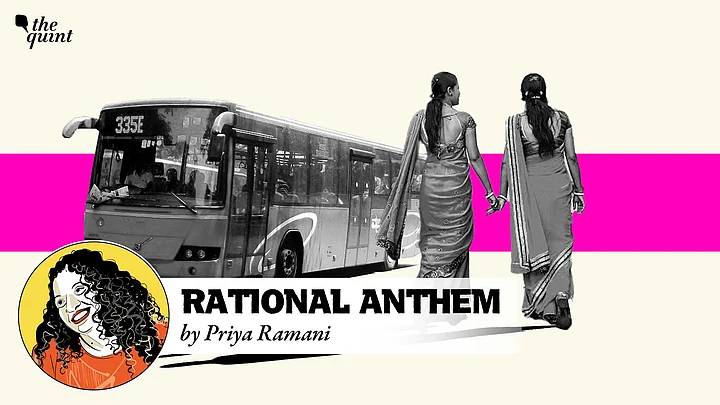The biggest hurdle to empowering Indian women through policy change is Indian men, and there’s no better example of this than the Shakti free bus transport scheme for all women residing in Karnataka. One study describes it as the most effective of such schemes across the country (Delhi, Telangana, Tamil Nadu, and Punjab have similar schemes), and that’s why, I believe, it’s also the most threatening. In the long run, challenging societal norms, as Shakti does, is beneficial to men too.
“Buses, Oh My God!”
The opposition Bharatiya Janata Party has attacked Shakti from day one. But this week, a veteran Congress politician ranted against the scheme that was launched by his own political party two years ago, which significantly transformed the lives of the state’s women. “Women are everywhere. If a man boards the bus by mistake, he will have a hard time.”
“Men are now facing a situation where they are being pushed aside by women as they try to get on the bus,” RV Deshpande, eight-time MLA, said earlier this week. “Before the launch of the Shakti scheme, buses were not packed. Now, the congestion has become intense, and the circumstances have worsened.” Maybe buses were not packed because half the population stayed home?
Deshpande’s discomfort can best be explained by the premise of the book, Why Loiter? Women and Risk on Mumbai’s Streets by Shilpa Phadke, Sameera Khan, and Shilpa Ranade: Women are given permission to venture into public spaces but not to own them.
'Men outside, women inside' has been the mantra of our society for as long as I can remember.
When women go outside, there are innumerable rules about the way they should speak or act or dress; in whose company they should be; and until what time they can access public spaces. All these determine whether or not we will take responsibility for their safety. So even a chief minister like Mamata Banerjee, leader of a political party that prides itself on its women legislators’ representation numbers, freely makes misogynistic statements about how women should not be allowed to step outside their hostel at night. She’s also ignoring the fact that the most unsafe place for Indian women and children remains the home.
Real-body-politik
The overwhelming success of Karnataka’s Shakti scheme has turned this entrenched “inside-outside boundary”, as Why Loiter? describes it, on its head, and men are obviously reluctant about sharing a vast, open kingdom that once belonged largely to them. They feel discomfited by the sudden loss of control over the comings and goings of the women in their lives. As my mother-in-law’s driver complained to a guest who wanted to know about Karnataka's Congress-led government's policies: “They [women] go anywhere now.”
Overnight, men have lost their right to manspread, that phenomenon where they spread their legs taking up the space of the adjacent seat too, irrespective of the discomfort of their fellow passengers in public or private transport. Try manspreading in a bus that has equal representation of women; instead, men are being pushed to cede and share spaces equally with women. Disregarding generations of inequality, men like Kiran Kumar are asking: “Is this fair? Is this equal?"
The scheme gives women unfettered access to the world outside their homes. There are more women in public spaces, more women working, more money in the pockets of women (so more purchases for family wellbeing), more women feeling free. A record 500 crore plus tickets have been issued to women since the scheme was launched in July 2023.
“We tell our family members/men that there is this free bus scheme, and we don’t go anywhere, neither do you take us out anywhere – since this bus service is free, five of us ladies will get together and go somewhere on a trip—how can we stay cooped up inside the house all the time— we have to go out too, and know about the outside world….,” one respondent told researchers from the Just Jobs Network who were analysing the impact of the scheme in Karnataka.
Gender-Progressive, Not Gender-Biased
Imagine that. Women stepping out of the house, not needing the assistance of men, asserting their right to leisure—until now, an elusive, inaccessible idea for many. Women told researchers of the above study that male conductors and drivers were disrespectful and bitter towards them, likely because they were receiving free bus transport. Similar patterns have been seen in Tamil Nadu and Delhi, the researchers said.
Honestly, such schemes are bound to work to the benefit of all, and men need to look at the issue differently. More passengers and the spotlight on the bus network can only mean more emphasis on public transport.
At the two-year anniversary of the scheme, the transport minister said the government had added 5,800 new buses, recruited 10,000 employees and helped transport corporations clear part of their debts. The state plans to make up the shortfall from fare hikes, taxes and budget reallocations. It hopes that money saved on bus tickets will eventually translate to higher GST collections.
As Mumbai focuses on making coastal roads accessible (only to a few) while neglecting its once formidable bus and train networks, Bangalore has the chance to create a more inclusive system that benefits all. So what if there are hiccups on the way? Now all we have to do is convince men it’s okay to share public spaces with women.
(The author is the founder of India Love Project and on the editorial board of Article 14. This is an opinion piece. All views expressed are the author’s own. The Quint neither endorses nor is responsible for them.)
